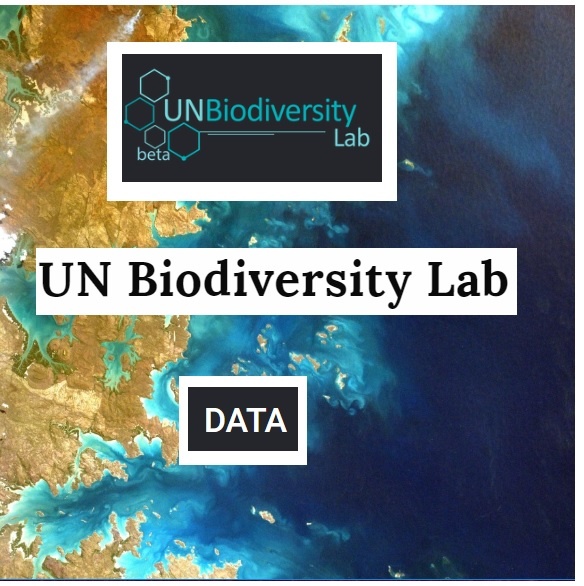The UN Biodiversity Lab : a scalable open-source Data platform to provide key information on the Aichi Biodiversity Targets and nature-based Sustainable Development Goals
19/12/2018


Currently, many countries still lack access to geospatial data due to limitations in data availability and technical capacity.
The free, online, open-source UN Biodiversity Lab platform provides spatial data through a free, cloud-based tool to support Parties to the UN Convention on Biological Diversity (CBD) in reporting on their achievements and to inform their conservation decision making.
|
The UN Biodiversity Lab platform was launched in 2018 by the United Nations Development Program (UNDP), the United Nations Environment (UN Environment), and the Secretariat of the Convention on Biological Diversity (CBD) Secretariat. |
The core mission of the UN Biodiversity Lab is three-fold:
|
1.) To allow policymakers and other partners to access global data layers for national action, upload and manipulate their own datasets, and query multiple datasets to provide key information on the Aichi Biodiversity Targets and nature-based Sustainable Development Goals. |
|
2.) To improve accountability and enable better decisions through spatial literacy. |
|
3.) To revolutionize biodiversity planning through transparent spatial data reporting and analyses. |
The UN Biodiversity Lab data is powered by MapX, the only UN-backed geospatial mapping software which:
- collects and verifies scientific data,
- brokers knowledge exchange for people in need of spatial solutions to environmental and natural resource challenges, and
- offers a customizable toolkit for analysis, visualization, and sharing.
By creating a collaborative, open-source environment, the UN Biodiversity Lab is an inclusive and scalable data platform.
The platform is continuously adding data with planned additions from:
- Global Resource Information Database (GRID-Geneva),
- NASA,
- Food and Agriculture Organization of the United Nations (FAO),
- UN Environment World Conservation Monitoring Centre and other UN agencies,
- International Union for Conservation of Nature (IUCN),
- National Oceanic and Atmospheric Administration (NOAA-Modis),
- Alliance for Zero Extinctions,
- Birdlife,
- The Knowledge Network for Biocomplexity (KNB),
- Google Earth Engine,
- GRID Arendal,
- US Geological Survey (USGS),
- Flanders Marine Institute and other premier research institutions.
All data providers recognize the need for innovative tools to monitor trends through utilizing spatial data, better understand the causes of global biodiversity loss, and to provide data that can help assess the socio-economic implications of different pathways.
The importance of enhancing access to big data...
... for sustainable development is highlighted by the Nature for Development Declaration on Spatial Data, which was opened for public endorsement at the launch event. To date, 20 institutions have endorsed the Declaration. A large number of countries, UN Agencies, NGOs, academic institutions, and indigenous peoples organizations are expected to endorse. Over time, the UN Biodiversity Lab will offer access to big data on sustainable development, and incorporate automated monitoring using artificial intelligence (AI) to support planning for human and planetary health.
Learn more about UNBiodiversityLab here
RELATED:
|
You are invited to propose new GEO Flagships, Initiatives or Community Activities The Group on Earth Observations (GEO) is an intergovernmental partnership that improves the availability, access and use of Earth observations for a sustainable planet. The GEO Secretariat and the GEO Progamme Board have launched the process to develop the 2020-2022 GEO Work Programme. You are invited to propose new GEO Flagships, Initiatives or Community Activities. Implementation Plans for the proposed activities should be sent to the GEO Secretariat [email protected] no later than 15 February 2019. Detailed information and guidance for the preparation of the Implementation Plans may be found at the 2020-2022 GEO Work Programme webpage at http://www.earthobservations.org/gwp2020_dev.php For those new to GEO, the Work Programme consists of GEO Community Activities, GEO Initiatives, GEO Flagships and GEO Foundational tasks, collectively known as the GEO Implementation Mechanisms. You can get an overview idea from the GEO 2017-2019 Work Programme at http://www.earthobservations.org/geoss_wp.php |
- Collect Earth Online (CEO) next generation tool allows anyone to track land-use data and landscape changes anywhere
- FAOSTAT provides free access to food and agriculture data for over 245 countries and territories and covers all FAO regional groupings
- from 1961 to the most recent year available
- Advancing the use of Earth Observation Data for critical issues relating to Land, Climate, Food and Nutrition in AFRICA
- OpenForis : Free Open-Source Solutions for Environmental Monitoring
- OpenForis Collect Mobile provides intuitive data collection and validation in the field
- The Africa Regional Data Cube is a new tool that harnesses the latest Earth observation and satellite technology to help Kenya, Senegal, Sierra Leone, Ghana, and Tanzania address food security as well as issues relating to agriculture, deforestation, and water access
- DATA-DRIVEN AGRICULTURE (Recorded Webinars; GFAR / CTA / GODAN)
- Geographic Information System (GIS) teachers guide
- UN Convention on Biological Diversity and Public Health
- Modeling and forecasting African Urban Population Patterns : MAUPP
- Welcome to Open Data Management in Agriculture and Nutrition Online Course
- FAIR PRINCIPLES TO ALL ELEMENTS OF AGRICULTURAL-RELATED RESEARCH PROCESSES (IGAD RDA's 11th pre-meeting, March 2018, in Germany/Berlin)
- DATA COLLECTION IN AFRICA: STATE OF THE ART, CHALLENGES & SOLUTIONS (IGAD RDA's 12th pre-meeting, November 2018, in Africa/Botswana)
- Unfold Open Data with APERTIO
- Find the DATA You need ... more easily with Google Dataset Search
You are welcome to Sign up for AIMS News, follow @AIMS_Community on Twitter... And, thanks again for your interest!
